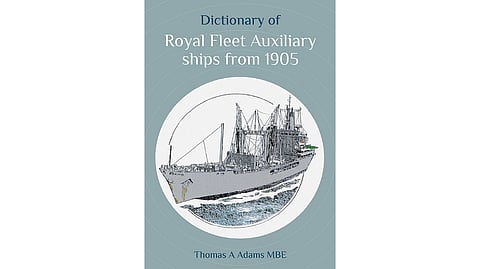BOOK REVIEW | Dictionary of Royal Fleet Auxiliary Ships from 1905
Essential for the operation of warships since the death of sail, auxiliaries are the forgotten adjunct to maritime power, often neglected and mistreated by those with their fingers on defence spending, and yet no navy can operate without them.
This fine book takes a close look at the ships of the UK’s Royal Fleet Auxiliary (RFA), from the days when the Royal Navy was the most powerful in the world, to the changed circumstances of today.
A dictionary, inasmuch as the huge fleet of more than 430 vessels is sorted alphabetically by name, this might equally be regarded as an important contribution to Britain’s naval history since the start of the 20th century.
The first section of this enormous work of scholarship is a concise history of the service that would eventually become as the RFA, spelling out its function and philosophy. The author shows how its task has widened from fuelling and feeding the fleet to a considerable range of additional duties, from disaster relief, law enforcement, damage and repair support to providing platforms for amphibious warfare and aviation support.
It takes the reader from the days when the far-flung fleet depended on the availability of coal stocks, to the dramatic changes to fuel oil and the multiplicity of consumables required in a modern era.
It traces the advances in technology that made possible the ability to refuel ships at sea and transfer stores between them while under way. It shows an interesting interplay between the Admiralty and the commercial world, frequently intervening to plug gaps by chartering or purchasing merchant vessels, and using ingenious design skills to upgrade them to the RFA’s requirements.
It is a book that has been amazingly well-researched, but is more than a listing of every RFA ship, big and small, that has ever sailed. The technical details and the function of each ship are carefully laid out.
The author, who clearly has considerable insights into the workings of the Ministry of Defence, uses this experience to show the thinking of the admirals, constructors and designers, the sea lords, and political masters, in providing (or not) the navy with what it needs to exist and to fight.
He observes the way in which the specification of a ship is often subject to endless interference, the lessons each generation is forced to learn about the need to do detailed design before starting to build, and seeing spiralling cost increases because of indecision, interference and poor shipbuilding practice.
It is a beautifully written book with lessons that go far beyond the UK, about changing political priorities, the disappointments of projects abandoned and strange decisions, of ships that did not perform as expected and, in the more recent times, of trying to construct important strategic assets with a shipyard sector that was falling apart and incapable of delivering on time or on budget.
This is an important contribution to maritime history; a book, with authority; that can be dipped into with great enjoyment by both the general reader and those more professionally concerned with sea-going logistics support. The author and the publisher are to be congratulated.
Author: Thomas A Adams
Available from Whittles Publishing, UK


